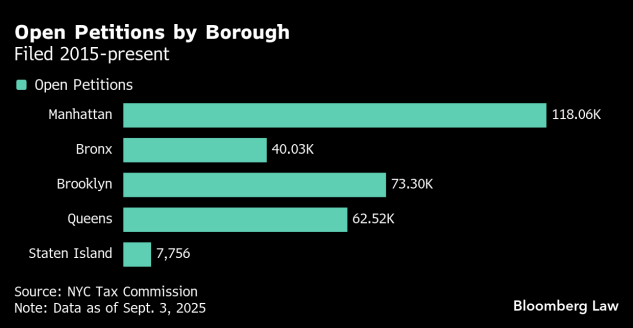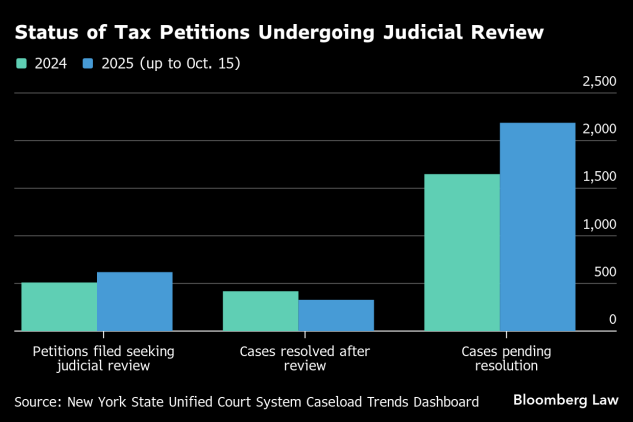Hundreds of petitions are filed in New York City each day throughout September and October challenging the city’s property tax assessments.
On one Thursday last month, there were more than 500 petitions filed in Manhattan alone, including from hotels, major retailers such as Macy’s and Bloomingdale’s, and property owners including the New York City Bar Association, the James Beard Foundation, and New York University. And thousands more have continued to roll in as petitioners scramble to meet an Oct. 24 filing deadline.
The defendant in each, often written in all capital letters: THE TAX COMMISSION OF THE CITY OF NEW YORK, AND THE COMMISSIONER OF FINANCE OF THE CITY OF NEW YORK.
The filings are part of an annual song and dance for attorneys, the Tax Commission, the New York City Law Department, and the court system. There are nearly 300,000 or more open petitions—including a handful dating back to the 1970s and petitions submitted over multiple years for the same lot—that have been filed with the court, according to Tax Commission data. Nearly 200,000 of those were filed in the past five years, and more than 2,100 are awaiting trial.
There are just four judges in the entire city to handle the thousands of cases that reach them—and several other reasons for the city to slow-roll the process.
“Time goes by quickly, and you’re dealing with owners who have enormous demands on them,” said Robert Pollack of Marcus & Pollack LLP. Owners are “sitting there dying on the vine.”
Assessments
The city’s Department of Finance calculates tax assessments for each parcel of property and publishes them every January. Property owners have until March to file an application seeking a correction—typically a reduction—to the assessment. If the commission hasn’t held a hearing on a particular application or if an owner rejects the commission’s offer, the owner has until Oct. 24 file what’s known as an Article 7—or tax certiorari—petition with the court.
But to get before a judge, there have to be three years of outstanding petitions. Owners re-file their petitions every year to preserve their review, explained Martha Stark, policy director of Tax Equity Now, or TENNY. The group is the lead plaintiff on a closely-watched lawsuit challenging the property tax code, which is working its way through a state trial court.
The more than 2,000 pending cases seeking judicial intervention is a record high, said Benjamin Williams of Rosenberg & Estis PC.
While tax attorneys lament the long wait times, the city asserts its attorneys are moving matters more quickly than in years past and that complaints about delays are from attorneys who “just want to get their own clients moved up in the process.”
Waiting Game
A request for judicial intervention doesn’t necessarily make the process go any faster—it merely puts the case on the court’s calendar and escalates it to one of the four judges, kicking off pre-trial settlement negotiations with the Law Department and the Bankruptcy Division.
Petitioners can go to trial in their county’s Supreme Court if their case doesn’t settle, but trials in New York City are rare, Williams said. Court data show zero trials since 2024.
But the paucity of judges isn’t the sole reason for the delays. Some tax litigators say it’s the New York City Law Department persuading judges not to issue scheduling orders that would set a timeline by which both parties would get the appraisals they need to move forward with negotiations.
“It’s to the city’s advantage to delay the resolution of cases, unfortunately, at the cost of property owners,” said Pollack, who is also president of the Real Estate Tax Review Bar Association.
The city also doesn’t have to pay back interest on overpaid taxes unless the property owner goes to court and wins. Property owners continue to pay taxes at the assessed rates, further incentivizing delays.
The Law Department holds settlement conferences only once every three months and “very often you make no progress” in those conferences, said Pollack.
Stark recalled one case in which a building owner waited seven years before getting a reduction for two years’ worth of petitions, all because the building’s square footage was calculated incorrectly. Williams also said he has cases that have been open for five to 10 years.
“It’s time consuming, especially for mistakes like square footage,” said Stark, a former commissioner of the New York City Department of Finance.
Dealing With the Backlog
The Law Department said its attorneys “diligently evaluate requests for tax reductions.” Delays can happen when petitioners don’t respond to the agency’s request for information in a timely manner, or when “overly litigious parties and frivolous cases waste resources and add to the high volume of matters.”
The agency also emphasized it’s still recovering from losing numerous tax attorneys during the Covid-19 pandemic, saying, “Nevertheless, due to our enhanced recruiting efforts over the years and our expert team, we’ve been able to address obstacles and continue to meet our mission to fairly and efficiently evaluate these complex cases.”
And the workload isn’t expected to stop. Peter Blond of Brandt, Steinberg, Lewis & Blond LLP said he expects there will be more trials coming up in the next two years, stemming from petitions that were filed during the pandemic and are finally able to escalate to a judge.
The results of the mayoral race could also bring real estate taxes into the spotlight as Democratic nominee Zohran Mamdani has discussed raising taxes. All of that is happening against the backdrop of massive federal funding cuts to the entire state.
“It’s interesting times in a field that normally, quite frankly, is like watching paint dry,” Blond said.
To contact the reporter on this story:
To contact the editors responsible for this story:
Learn more about Bloomberg Tax or Log In to keep reading:
See Breaking News in Context
From research to software to news, find what you need to stay ahead.
Already a subscriber?
Log in to keep reading or access research tools and resources.


